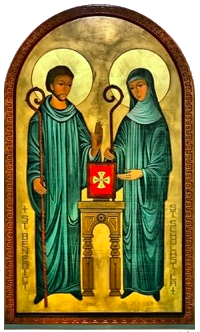Our Patron Saints - Benedict and Scholastica

What is a patron saint? A patron saint is a saint who reflects the values and commitments of a specific church, community or individual. This person has already entered into the presence of God and is regarded as an intercessor and advocate in heaven on behalf of that church, community, or individual who has identified with that particular saint.
Every time we recite the Apostle’s Creed we say, “I believe. . .in the communion of saints.” The Church consists of all God’s people, not only those alive today but also those who came before us, and who now dwell in the presence of God (Hebrews 12:22-24; Luke 20:37-38). The Scriptures refer to them as a “cloud of witnesses” (Hebrews 12:1). Since these saints remain alive in Christ, we believe that they faithfully pray for his church and its members now just as they did when they were on earth. The prayers of our brothers and sisters in Christ here on earth are only effective insofar as God answers them. It is the same with the intercessions of the saints in heaven for us. They can never answer prayers of their own accord or in their own power; they can only beseech Christ the Lord on our behalf. For their prayers we are very thankful.
Saint Benedict
Saint Benedict of Nursia (c.480-547) is considered the founder of Western monasticism. His Rule provided the framework for monastic life and was so influential that the early Middle Ages have been called “the Benedictine centuries.” His achievement was to produce a monastic way of life which was complete, orderly, and workable. The monks’ primary occupation was liturgical prayer, complemented by sacred reading and manual work of various kinds. Benedict’s own personality is mirrored in his description of what kind of man the abbot should be: wise, discrete, flexible, learned in the law of God, but also a spiritual father to his community. His thoughts on spiritual formation and the Christ-centered life continue to have widespread influence today.
In the Rule of St. Benedict, he writes “'The Lord says in the Gospel, ‘Whoever listens to these words of Mine and acts upon them, I will liken to a wise person who built a house on rock. The floods came, the winds blew and beat against that house, and it did not fall, because it had been founded on rock’ Having given us these assurances, the Lord is waiting every day for us to make our life correspond to His holy admonitions.” Because of instructions like these, the approach of St. Benedict to spirituality has been characterized as "always we begin again."
Prayer
Lord, you chose St. Benedict to follow you and made him the founder of a great religious family in your church. Help me, through his intercession, to choose the vocation you have destined for me and to follow it with generosity, steadfastness and courage all the days of my life. May the spirit of St. Benedict inspire me to prefer nothing to you, to lead a life of prayer, to form myself on your word and to labor for the salvation of all people. I ask this of you, Lord Jesus, who lives and reigns with the Father and the Holy Spirit forever. Amen.
Saint Scholastica
Saint Scholastica, was born about 480 in Italy. She is the twin sister of St. Benedict, the father of Western monasticism. Scholastica founded a community for nuns and, like her brother, sought to place God at the very center of her life.
The little that we know of Scholastica is written by St. Gregory the Great. He relates an instance when Scholastica went to visit her brother and both were talking about the spiritual life. When it was time for Benedict to return to his monastery, Scholastica pleaded with him to stay and continue their dialogue. However Benedict would not relent, so Scholastica prayed that God would keep her brother there with her. A fierce rain storm arose and Benedict could not return to his monastery. He was upset with his sister but she responded that “what you would not grant to me, our loving God did.”
Some spiritual writers refer to Scholastica as the patron saint of right relationships. She knew how to prioritize her life. Her love for God was first in everything. Her service and work was a manifestation of her first love. At her death, her brother Benedict had a vision of her soul ascending like a dove into heaven.
Prayer
O God, to show us where innocence leads, you made the soul of your beloved Saint Scholastica soar to heaven like a dove in flight. Grant that through her prayers and example I may so live in innocence as to attain to joys everlasting. This I ask through our Lord Jesus Christ, who lives and reigns with the Father and the Holy Spirit forever. Amen.


